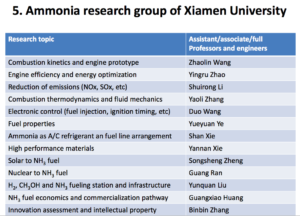A Roadmap for Ammonia Fuel in Fujian Province
By Trevor Brown on October 13, 2016
Researchers from Fujian Province presented their work at the 2016 NH3 Fuel Conference, and introduced the far-reaching plans of the Ammonia Fuel Synergy group at the College of Energy, Xiamen University, in China.
Forest (Zhaolin) Wang’s presentation, Ammonia as a Key to Meeting the Fuel Demand of China, contained valuable insight into the potential of ammonia fuel in China, and outlined the group’s roadmaps for developing an ammonia-natural gas dual fuel car by 2018, and an ammonia-methanol dual fuel car by 2020.
Both these demonstration projects are designed to build upon existing fuel use in China, where gasoline-natural gas dual fuel taxis are already widely used, and methanol fuel taxis are in active use in several provinces and are being strongly promoted by government.
The presentation illustrated the environmental challenges in China, as well as the rationale for using ammonia to solve them. Among the salient points:
- The car ownership rate is currently 0.05 in China, or 1 car for 20 people (for comparison, it is 0.5 in the US, or 1 car for 2 people).
- Chinese car ownership, which is limited by government policy, is expected to grow very quickly, at 15% per year (0% expected growth in the US).
- Beyond reducing CO2 emissions, China needs to reduce photochemical smog – a defining issue – which is formed by particulate matter from carbon-based fuels (volatile organic compounds or VOCs). Ammonia fuel contains no carbon, and its combustion forms no VOCs.
- While the deployment of electric trains has successfully reduced emissions, the wide adoption of electric cars is challenging because “clean battery production is a bottleneck.”
- China already produces 33% of the world’s ammonia, making 58 million tons in 2015: enough to power 50% of China’s 150 million cars.
- In China, the cost of NH3 fuel is currently one third the cost of gasoline. This is based on the energy from combustion, and 2015 average prices of CN¥2,100/ton (US$315/ton) for ammonia and CN¥8,000/ton (US$1200/ton) for gasoline.

Ammonia as a Key to Meeting the Fuel Demand of China (Wang)
NH3 Fuel Conference, 09/20/2016
The ammonia fuel research team at Xiamen University is taking a broad scope, with research topics including engine efficiency and optimization, reduction of emissions, NH3 fueling station and infrastructure, commercialization pathway, innovation assessment and intellectual property, solar-to-NH3 fuel, and nuclear-to-NH3 fuel.
Forest (Zhaolin) Wang leads the program for combustion kinetics and engine prototype. His NH3 Fuel Conference abstract and presentation are available here.